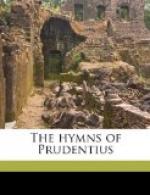26 A common idea in all literatures. Cf.
Virg., Aen., vi. 278
(taken from Homer),
tum consanguineus Leti Sopor, and Tennyson’s
“Sleep, Death’s
twin-brother” (In Memoriam, 68).
44 Cf. Augustine, Serm. 103:
“These evil spirits seek to seduce
the soul: but when
the sun has arisen, they take to flight.”
59 The denial of Peter forms a subject of Christian
casuistry in
patristic literature,
and this passage recalls the famous classical
parallel in Euripides
(Hipp. 612), “the tongue hath sworn:
yet
unsworn is the heart.”
Cf. Augustine, cont. mendacium: “In
that
denial he held fast
the truth in his heart, while with his lips he
uttered falsehood.”
For a striking representation of Peter and the
cock, on a sarcophagus
discovered in the Catacombs and now deposited
in the Vatican library,
see Maitland’s Church in the Catacombs,
p. 347. The closing
words of the passage in Ambrose’s Hexaemeron,
already referred to
under l. 2, may here be quoted: “As the
cock
peals forth his notes,
the robber leaves his plots: Lucifer himself
awakes and lights up
the sky: the distressful sailor lays aside his
gloom, and all the storms
and tempests that have risen in fury under
the winds of the evening
begin to die down: the soul of the saint
leaps to prayer and
renews the study of the written word: and
finally, the very Rock
of the Church is cleansed of the stain he had
contracted by his denials
before the cock crew.”
81 ff. The best commentary on these words
is to be found in the
following passage from
the second epistle of Basil to Gregory
Nazianzen: “What
can be more blessed than to imitate on earth the
angelic host by giving
oneself at the peep of dawn to prayer and by
turning at sunrise to
work with hymns and songs: yea, all the day
through to make prayer
the accompaniment of our toils and to season
them with praise as
with salt? For the solace of hymns changes the
soul’s sadness
into mirth.”
II
1 This poem furnishes two hymns to the Roman Breviary,
one to be sung
on Wednesday at Lauds,
and consisting of ll. 1-8, 48-53 (omitting l.
50), 57, 59, 60, 67
(tu vera lux caelestium) and 68: the other
for Thursday at Lauds,
consisting of ll. 25 (lux ecce surgit
aurea), 93-108.
17 Cf. Ambrose, ii. 8, de Cain et Abel:
“The thief shuns the day
as the witness of his
crime: the adulterer is abashed by the dawn
as the accomplice of
his adultery.”




